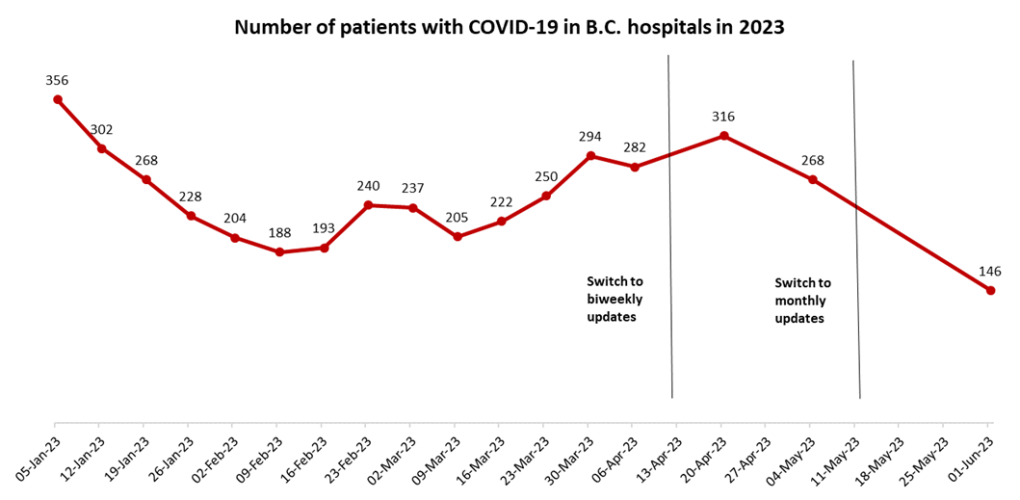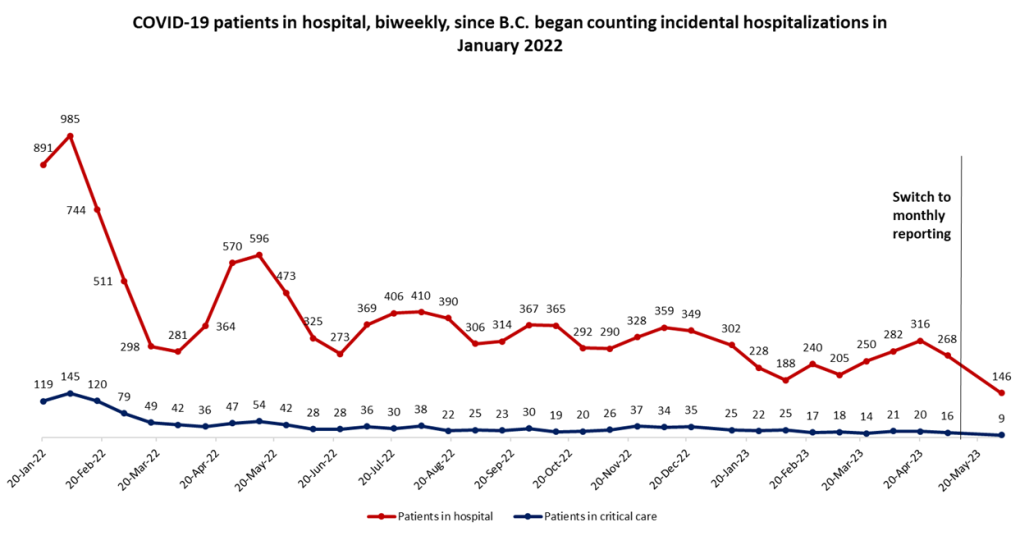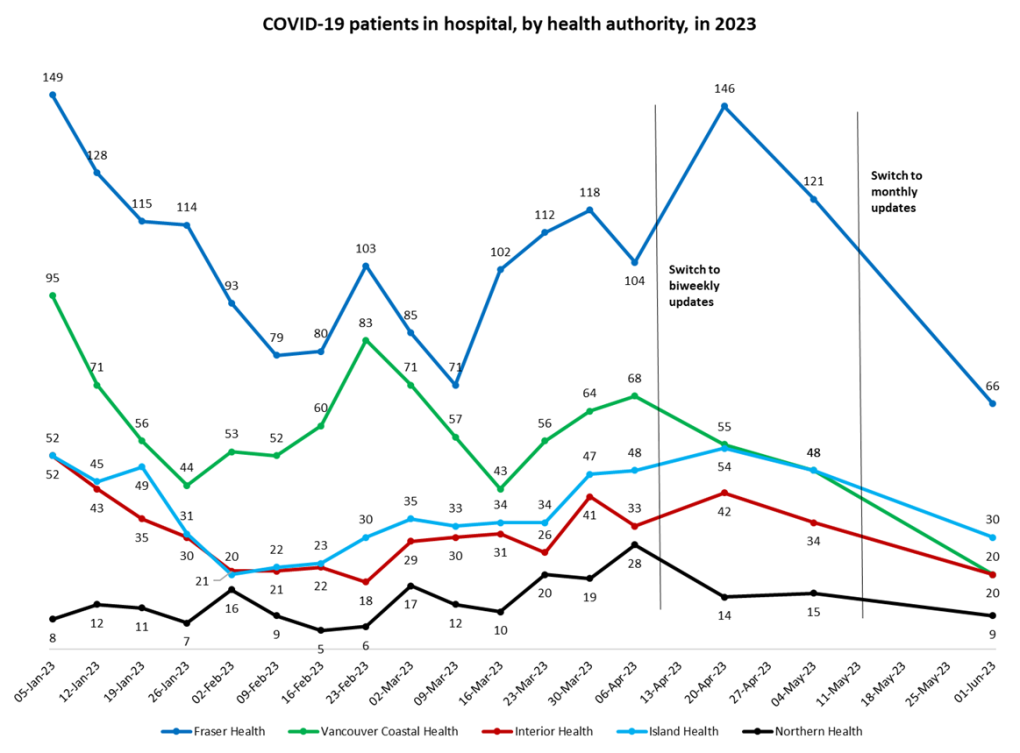B.C. COVID-19 hospitalizations hit their lowest level in almost 2 years this month
 The exterior of the B.C. Centre for Disease Control office in Vancouver is seen in this photo from the centre's website. (bccdc.ca)
The exterior of the B.C. Centre for Disease Control office in Vancouver is seen in this photo from the centre's website. (bccdc.ca)
Weekly wastewater surveillance data from the B.C. Centre for Disease Control suggests COVID-19 transmission has continued declining in the Lower Mainland this month, a week after the centre reported its lowest hospitalization total in nearly two years.
Wastewater data published this week shows decreasing concentrations of the SARS-CoV-2 virus in all five Metro Vancouver treatment plants.
As of June 4, concentrations at Lions Gate treatment plant on the North Shore had declined by 42 per cent compared to the previous week. Northwest Langley saw a decrease of 33 per cent, Annacis Island decreased by 29 per cent, Iona Island saw a 22-per-cent decrease and Lulu Island a 10-per-cent decrease.
Data for treatment plants outside the Lower Mainland had not been updated to include June 4 data as of Friday. Instead, they showed data from May 28, when all tracked regions except Kamloops and Nanaimo saw a decrease.
MONTHLY DATA
Wastewater has been the exception to the BCCDC's transition to monthly reporting of COVID-19 numbers.
Data on wastewater continues to be updated weekly on the centre's website, providing some insight as to the direction disease transmission may be heading between monthly updates.
This month's update, released June 1, showed a significant decline in the number of people in hospital with COVID-19 in B.C., which CTV News has been tracking closely since the start of the pandemic.
There were 146 test-positive COVID-19 patients in B.C. hospitals as of June 1, the lowest total seen all year.
 The number of people in hospital with COVID-19 in B.C. in 2023, as reported by the BCCDC, is shown. (CTV)
The number of people in hospital with COVID-19 in B.C. in 2023, as reported by the BCCDC, is shown. (CTV)
Indeed, the last time the BCCDC reported a hospitalized population lower than 146 was almost two years ago, in August 2021.
At that time, the province used a different method of counting hospitalizations that sought to account for whether COVID was the underlying reason a patient was in hospital. Patients who tested positive for the disease incidentally, while in hospital for other reasons, were not included in the count.
Since the BCCDC began including incidental hospitalizations in its total, 146 is the lowest number it has reported in any update.
 The number of patients in hospital with COVID-19, as reported by the BCCDC, since the province switched to including incidental hospitalizations in its count in January 2022. (CTV)
The number of patients in hospital with COVID-19, as reported by the BCCDC, since the province switched to including incidental hospitalizations in its count in January 2022. (CTV)
Underlying the June numbers were drops in hospitalizations across all of B.C.'s regional health authorities, perhaps most notably in Vancouver Coastal Health, where just 20 people were in hospital as of June 1.
There were fewer people in VCH hospitals than there were in hospitals in the Island Health region, despite the fact that Island Health has roughly 400,000 fewer residents. The VCH total was tied with that of Interior Health, which also has a significantly smaller population.
 The number of COVID-19 patients in hospital by health authority in 2023 is shown. (CTV)
The number of COVID-19 patients in hospital by health authority in 2023 is shown. (CTV)
CTV News asked VCH if it had any explanation for why fewer people are ending up in hospital with COVID-19 in the region. The answer was no.
"COVID continues to circulate and will cause different impacts in different places as it has at all times during the pandemic, however, thanks to high rates of vaccination and less virus circulating, the number of cases continues to decline overall," a spokesperson said via email.
CTVNews.ca Top Stories

'Anything to win': Trudeau says as Poilievre defends meeting protesters
Prime Minister Justin Trudeau is accusing Conservative Leader Pierre Poilievre of welcoming 'the support of conspiracy theorists and extremists,' after the Conservative leader was photographed meeting with protesters, which his office has defended.
'My stomach dropped': Winnipeg man speaks out after being criminally harassed following single online date
A Winnipeg man said a single date gone wrong led to years of criminal harassment, false arrests, stress and depression.
Bank of Canada officials split on when to start cutting interest rates
Members of the Bank of Canada's governing council were split on how long the central bank should wait before it starts cutting interest rates when they met earlier this month.
'One of the single most terrifying things ever': Ontario couple among passengers on sinking tour boat in Dominican Republic
A Toronto couple are speaking out about their 'extremely dangerous' experience on board a sinking tour boat in the Dominican Republic last week.
7 surveillance videos linked to extortions of South Asian home builders in Edmonton released
The Edmonton Police Service has released a number of surveillance videos related to a series of extortion cases in the city now dubbed 'Project Gaslight.'
Ukraine uses long-range missiles secretly provided by U.S. to hit Russian-held areas, officials say
Ukraine for the first time has begun using long-range ballistic missiles provided secretly by the United States, bombing a Russian military airfield in Crimea last week and Russian forces in another occupied area overnight, American officials said Wednesday.
Pilot reported fire onboard plane carrying fuel, attempted to return to Fairbanks just before crash
One of the two pilots aboard an airplane carrying fuel reported there was a fire on the airplane shortly before it crashed and burned outside Fairbanks, killing both people on board, a federal aviation official said Wednesday.
BREAKING Manitoba government tables bill to end ban on homegrown recreational cannabis
Manitoba is planning to lift its ban on the home growing of recreational cannabis.
All Alberta wildfires to date in 2024 believed to be human-caused: province
There are 63 wildfires burning in Alberta's forest protection area as of Wednesday morning and seven mutual aid fires, including one in the Municipal District of Peace.
































